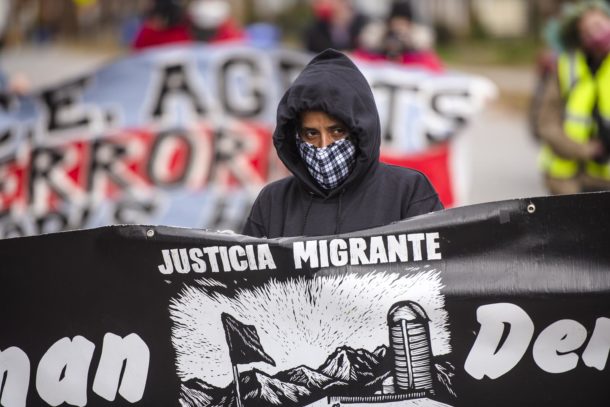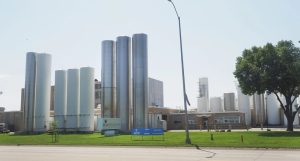
“The health and welfare of the agricultural workforce is integral to the sustainability of our food system and the agricultural industry, yet agricultural workers face ongoing, egregious human rights abuses,” said the letter, which was signed by 75 shareholders representing a total of $121 billion in assets under management.
Migrant Justice, a worker-led economic and human rights organization based in Vermont, has been campaigning for Hannaford to address alleged human rights abuses in the supply chain of the dairy products sold under its brand label for nearly two years. The New England supermarket chain has 18 locations in Vermont.
About 800 Latino immigrants work on Vermont dairy farms, most of whom are undocumented, according to Kelly Dollan, the Vermont Migrant Education Program coordinator at the University of Vermont.
They often receive less than the minimum wage, work long hours without breaks or time to sleep, suffer from high rates of injury with few protections and live in substandard housing, according to a study conducted by Dr. Bindu Panikkar and Mary-Kate Barrett, a UVM professor and graduate, respectively.
The pandemic has exacerbated adverse conditions, according to Will Lambek, a Migrant Justice staff member who has been working on farmworker’s rights in Vermont for five years.
Many farms that aren’t part of the Milk with Dignity program did not provide personal protective equipment for their workers during the Covid-19 pandemic, Lambek said. Without paid sick leave, symptomatic workers on some farms still had to come to work, or owners would dock their pay or fire them. Insufficient and overcrowded housing made isolation and quarantine impossible for those infected and their close contacts, further increasing community spread.
Freddy Morales, a Mexican dairy worker in Addison County, said he worked without masks or Covid protection because his boss “did not believe in the pandemic.” After he and his two coworkers contracted Covid in February, they were told to continue working.
Over the next five days, Morales experienced persistent fevers, weak muscles, fatigue, chills and pounding headaches. He took two days off to rest — for which he was not paid — but shortly had to continue working 10 and 11-hour days, often outside in sub-zero temperatures, he said.
“It was five days of pain,” Morales said in an interview with VTDigger. “They were very difficult days. We told them that we were sick, but they did not care.”
Milk with Dignity
Under the Milk with Dignity program, corporations sign a legally binding agreement that they will buy their dairy products only from farms following the organization’s Code of Conduct, which sets standards around wages, hours, housing, safety and protections against sexual harassment, discrimination and retaliation.
Participating farms also agree to grant Migrant Justice organizers access to their workers for rights education and allow third-party monitoring from the Milk with Dignity Standards Council for compliance.
In return, corporations pay a premium to farmers, who can then afford to pay their workers fair wages, provide adequate housing and protective equipment and comply with all other aspects of the code of conduct.
“It’s a win-win-win program that ensures human rights for workers and provides them a greater voice and power in the workplace,” Lambek said. “It’s a program that gets farmers a higher price premium, as well as a more stable and satisfied workforce. And then it’s also something that benefits companies because they can make a verifiable claim that their products are being produced free from human rights violations.”
While not designed with a pandemic in mind, Lambek said the program’s communication and organizing infrastructure has been vital during the last year. Milk with Dignity linked farmers, workers and public health officials and provided information on public health guidelines and government aid as well as personal protective equipment.
“What we quickly learned last year is that the mechanisms for workers to become the frontline defenders of their human rights that Milk with Dignity establishes were incredibly important during the pandemic,” Lambek said.
Ben and Jerry’s, the ice cream company founded in Vermont, became the first participating corporation in 2017. The program now works with about 60 farms, which employ over 260 farmworkers and represent 20% of Vermont’s dairy production by volume. More than $1 million in premiums has gone directly towards improving working and living conditions for workers, according to a Migrant Justice report.
An Economic Boon
The money offered in premiums comes as a much-needed economic boon to a long-suffering industry. A continuous downturn in milk prices over the last 75 years has forced widespread closures, with the number of dairy farms dropping from 4,027 in 1969 to fewer than 650 today.
While milk production has increased overall due to consolidation and increased efficiency, unstable prices create a downward pressure on wages and labor conditions, according to the UVM study conducted by Panikkar and Barrett.
In 2015, Sandy Gebbie began renting out the dairy farm her family has worked on for five generations in Greensboro, after the frequent and severe fluctuations in dairy prices became too much to bear.
When her renter moved out four years later, she took Gebbie’s membership to Dairy Farmers of America and Agri-Mark Family Dairy Farms – the main dairy cooperatives that operate in Vermont – with her. Gebbie soon discovered that the cooperatives had stopped accepting new members in response to overproduction in the state, essentially shutting Gebbie out of the dairy business altogether.
“We’ve got a fifth-generation farm here with all the bells and whistles — one of the best farms in the county — and it will never milk cows again,” Gebbie said.
Economic pressures on dairy farms have increased through the pandemic. As restaurants and schools shut down and remained shuttered for extended periods of time, demand for milk plummeted, and the price followed.
With so few people to buy their product, some farmers had no other choice than to dump tanks full of milk into their manure pits, according to Diane Bothfeld, director of dairy policy at the Vermont Agency of Agriculture, Food and Markets.
As migrant workers and dairy farms suffered, Hannaford’s business boomed. U.S. comparable sales excluding gas of Ahold Delhaize, Hannaford’s parent company, increased 15.5% over the last two years.
“It’s not acceptable that a company like Hannaford’s is profiting while the workers who are responsible for keeping the shelves stocked are suffering,” Lambek said.
Hannaford has yet to respond to the investors’ letter and has not replied to Migrant Justice’s calls for them to join Milk with Dignity nor directly addressed the campaign in its two-year history.
Hannaford Supermarkets and Ahold Delhaize did not respond to requests for comment.
























